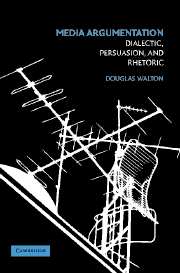Book contents
- Frontmatter
- Contents
- Acknowledgments
- Introduction
- 1 Logic, Dialectic, and Rhetoric
- 2 The Speech Act of Persuasion
- 3 Propaganda
- 4 Appeals to Fear and Pity
- 5 Ad Hominem Arguments in Political Discourse
- 6 Arguments Based on Popular Opinion
- 7 Fallacies and Bias in Public Opinion Polling
- 8 Persuasive Definitions and Public Policy Arguments
- 9 The Structure of Media Argumentation
- Bibliography
- Index
- Plate section
1 - Logic, Dialectic, and Rhetoric
Published online by Cambridge University Press: 05 June 2012
- Frontmatter
- Contents
- Acknowledgments
- Introduction
- 1 Logic, Dialectic, and Rhetoric
- 2 The Speech Act of Persuasion
- 3 Propaganda
- 4 Appeals to Fear and Pity
- 5 Ad Hominem Arguments in Political Discourse
- 6 Arguments Based on Popular Opinion
- 7 Fallacies and Bias in Public Opinion Polling
- 8 Persuasive Definitions and Public Policy Arguments
- 9 The Structure of Media Argumentation
- Bibliography
- Index
- Plate section
Summary
The three fields of logic, rhetoric, and dialectic are all about arguments, as Aristotle showed, but each takes a different viewpoint on them. Logic is the science of reasoning that studies formal inferential links between sets of propositions designated as premises and conclusion of an argument. Dialectic, usually taken to be a branch of logic, analyzes arguments given in a text of discourse, including fallacious arguments, evaluating them as weak or strong by examining criticisms of them (Kapp 1942; Walton 1998b; Finocchiaro 2005, ch. 13). Rhetoric studies persuasive arguments based on the beliefs, commitments, or values of the target audience to be persuaded (Kennedy 1963; Tindale 1999, 2004; Jacobs 2000). However, the long history of the relationship between logic and rhetoric has been an antagonistic one, characterized by strife and sniping on both sides, beginning with Plato's attack on the Sophists on the basis that they took fees to teach argumentation skills. This attack on rhetoric is visible in many places in Plato's dialogues (Krabbe 2000, p. 206). Aristotle took a balanced view of what he saw as a close relationship between rhetoric and dialectic, but an opposition between the two subjects remained (Hohmann 2000, p. 223). Aristotle thought of dialectic as “a rather pure and theoretically sound method aimed at a cooperative search for cognitive truth” (Hohmann 2000, p. 223), and hence by comparison, rhetoric still had negative implications that are still present.
- Type
- Chapter
- Information
- Media ArgumentationDialectic, Persuasion and Rhetoric, pp. 7 - 45Publisher: Cambridge University PressPrint publication year: 2007



